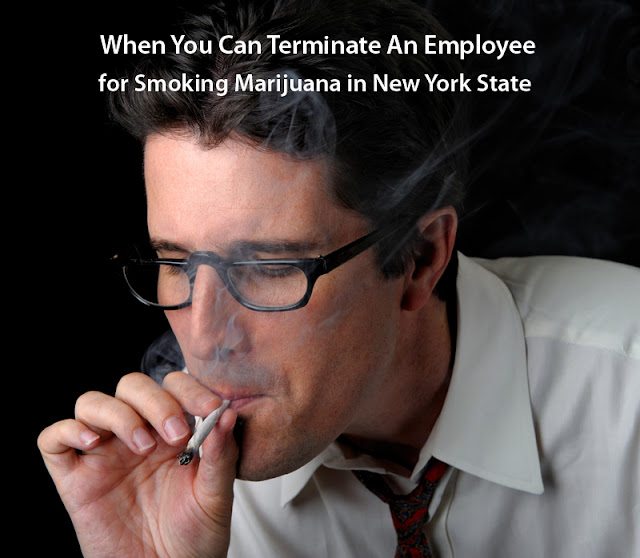Terminating Employees for Smoking Marijuana in NYS
When You Can Terminate An Employee for Smoking Marijuana in New York State
Not long ago, firing an employee for testing positive for marijuana was a regular occurrence for employers. With some states legalizing its use under certain conditions, a situation that used to be black and white has developed a lot of gray areas. There have also been a lot of gray areas developing in the mind of employers because it has been proven effective in treating some medical conditions. Marijuana use it is not appropriate in most workplaces, and some of the side effects can pose safety hazards for all the employees in the company.
In states like New York, firing an employee for using marijuana must be carefully weighed, sometimes on a case by case basis. The Compassionate Care Act allows residents to legally purchase and smoke medical marijuana, which means that some people who test positive can fall back on discrimination for medical conditions. It is essential for employers to know when you can terminate the employment of an employee for smoking marijuana in New York State.
Regulations that Prevent Terminating Medical Marijuana Patients
Patients, certified to use medical marijuana, are protected by the New York State Human Right Laws (NYSHRL) and some disability laws. With medical marijuana legalized, employers must ensure their company policies and work standards are in place to be compliant with the new regulations.
In the state of New York for employees who are “certified medical marijuana” users, employers who have four or more employees must:
- Not terminate employees who are certified medical marijuana patients.
- Cannot discipline an employee based on their use or manufacturing of medical marijuana.
- Must make reasonable accommodations for certified patients.
- If an employer performs any of these actions, they are at risk for discrimination claims.
Just like with any law that prohibits you from firing an employee, there are two main exceptions to the rules listed above.
- Laws do not prevent an employer from terminating an employee based on inability to perform one’s job-related duties while under the influence of a controlled substance.
- Laws do not force employers to continue a working relationship with an employee if it causes them to violate federal law, or if retention of the employee could cause the business to lose federal contracts or funding.
- These exceptions to the rule ensure that you are not forced to manage employees who are unable to perform their duties while they are under the influence of medical marijuana, or who will cause a financial downfall in your company.
Even though Certified Medical Marijuana Patients have some employment insurance through discrimination claims and allowances for drug testing, there are several things an employer can do to reduce the risk of liability in various situations. It would be recommended to consult with a local Corporate Lawyer who is familiar with all aspects of business law.
Patients certified to use medical marijuana have been deemed to be disabled by the NYSHRL. Any necessary accommodations are determined on a case by case basis and can be affected by several things including:
- The type of business in question.
- The position of the employee in the business.
- The reason for the patient’s use of medical marijuana.
- Employers do not have to allow the possession, or the use, of medical marijuana inside the workplace.
- Employers who have federal contracts or receive federal funding may be exempt from following the act. If federal agreements do not outline the use of medical marijuana, NYSHRL does not force an employer to allow or take any action, which causes the loss of federal funding or contracts.
- Employers should take the time to ensure that all human resource staff, supervisors, and managers understand the company’s obligation to employees who are considered “certified medical marijuana patients.” Training should be provided to all staff members with a supervisory role.
- All employers should attend seminars that will keep them up to date with medical marijuana laws in their state.
- Employers should review their drug and substance testing and abuse policies to ensure that they are up to date and are compliant with the Compassionate Care Act and the New York State Human Right Laws. Employers who are spread out over more than one state must ensure they comply with the laws and regulations of each state. They must understand their obligation to each state’s employees, and how the law varies from place to place.
About the Author
Fran Perdomo is a lawyer in NYC who specializes in all aspects of business, corporate, and entertainment law. Learn more by visiting her website at PerdomoLaw.
Additional References
- Medical Marijuana in the Workplace - US National Library of Medicine National Institutes of Health
- State Medical Marijuana Laws - National Conference of State Legislatures
The content of this blog has been prepared by Perdomo Law for informational purposes only and should not be construed as legal advice. The material posted on this website is not intended to create, and receipt of it does not constitute, a lawyer-client relationship, and readers should not act upon it without seeking professional counsel. Perdomo Law did not produce and is not responsible for the content of off-site legal resources. The materials on this site may constitute advertising under various state ethics rules.




Comments
Post a Comment